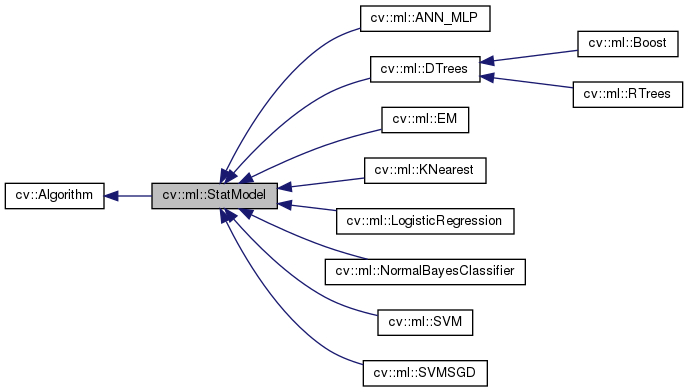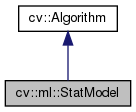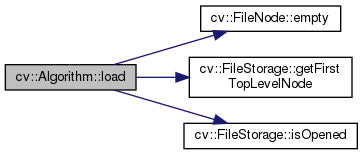Base class for statistical models in OpenCV ML. More...
#include <opencv2/ml.hpp>


Public Types | |
| enum | Flags { UPDATE_MODEL = 1, RAW_OUTPUT =1, COMPRESSED_INPUT =2, PREPROCESSED_INPUT =4 } |
| Predict options. More... | |
Public Member Functions | |
| virtual float | calcError (const Ptr< TrainData > &data, bool test, OutputArray resp) const |
| Computes error on the training or test dataset. More... | |
| virtual void | clear () |
| Clears the algorithm state. More... | |
| virtual bool | empty () const CV_OVERRIDE |
| Returns true if the Algorithm is empty (e.g. More... | |
| virtual String | getDefaultName () const |
| Returns the algorithm string identifier. More... | |
| virtual int | getVarCount () const =0 |
| Returns the number of variables in training samples. More... | |
| virtual bool | isClassifier () const =0 |
| Returns true if the model is classifier. More... | |
| virtual bool | isTrained () const =0 |
| Returns true if the model is trained. More... | |
| virtual float | predict (InputArray samples, OutputArray results=noArray(), int flags=0) const =0 |
| Predicts response(s) for the provided sample(s) More... | |
| virtual void | read (const FileNode &fn) |
| Reads algorithm parameters from a file storage. More... | |
| virtual void | save (const String &filename) const |
| Saves the algorithm to a file. More... | |
| virtual bool | train (const Ptr< TrainData > &trainData, int flags=0) |
| Trains the statistical model. More... | |
| virtual bool | train (InputArray samples, int layout, InputArray responses) |
| Trains the statistical model. More... | |
| virtual void | write (FileStorage &fs) const |
| Stores algorithm parameters in a file storage. More... | |
| void | write (const Ptr< FileStorage > &fs, const String &name=String()) const |
| simplified API for language bindings This is an overloaded member function, provided for convenience. It differs from the above function only in what argument(s) it accepts. More... | |
Static Public Member Functions | |
| template<typename _Tp > | |
| static Ptr< _Tp > | load (const String &filename, const String &objname=String()) |
| Loads algorithm from the file. More... | |
| template<typename _Tp > | |
| static Ptr< _Tp > | loadFromString (const String &strModel, const String &objname=String()) |
| Loads algorithm from a String. More... | |
| template<typename _Tp > | |
| static Ptr< _Tp > | read (const FileNode &fn) |
| Reads algorithm from the file node. More... | |
| template<typename _Tp > | |
| static Ptr< _Tp > | train (const Ptr< TrainData > &data, int flags=0) |
| Create and train model with default parameters. More... | |
Protected Member Functions | |
| void | writeFormat (FileStorage &fs) const |
Base class for statistical models in OpenCV ML.
|
virtual |
Computes error on the training or test dataset.
| data | the training data |
| test | if true, the error is computed over the test subset of the data, otherwise it's computed over the training subset of the data. Please note that if you loaded a completely different dataset to evaluate already trained classifier, you will probably want not to set the test subset at all with TrainData::setTrainTestSplitRatio and specify test=false, so that the error is computed for the whole new set. Yes, this sounds a bit confusing. |
| resp | the optional output responses. |
The method uses StatModel::predict to compute the error. For regression models the error is computed as RMS, for classifiers - as a percent of missclassified samples (0%-100%).
|
inlinevirtualinherited |
Clears the algorithm state.
Reimplemented in cv::FlannBasedMatcher, and cv::DescriptorMatcher.
|
virtual |
Returns true if the Algorithm is empty (e.g.
in the very beginning or after unsuccessful read
Reimplemented from cv::Algorithm.
|
virtualinherited |
Returns the algorithm string identifier.
This string is used as top level xml/yml node tag when the object is saved to a file or string.
Reimplemented in cv::AKAZE, cv::KAZE, cv::SimpleBlobDetector, cv::GFTTDetector, cv::AgastFeatureDetector, cv::FastFeatureDetector, cv::MSER, cv::ORB, cv::BRISK, and cv::Feature2D.
|
pure virtual |
Returns the number of variables in training samples.
|
pure virtual |
Returns true if the model is classifier.
|
pure virtual |
Returns true if the model is trained.
|
inlinestaticinherited |
Loads algorithm from the file.
| filename | Name of the file to read. |
| objname | The optional name of the node to read (if empty, the first top-level node will be used) |
This is static template method of Algorithm. It's usage is following (in the case of SVM):
In order to make this method work, the derived class must overwrite Algorithm::read(const FileNode& fn).
References CV_Assert, cv::FileNode::empty(), cv::FileStorage::getFirstTopLevelNode(), cv::FileStorage::isOpened(), and cv::FileStorage::READ.

|
inlinestaticinherited |
Loads algorithm from a String.
| strModel | The string variable containing the model you want to load. |
| objname | The optional name of the node to read (if empty, the first top-level node will be used) |
This is static template method of Algorithm. It's usage is following (in the case of SVM):
References CV_WRAP, cv::FileNode::empty(), cv::FileStorage::getFirstTopLevelNode(), cv::FileStorage::MEMORY, and cv::FileStorage::READ.

|
pure virtual |
Predicts response(s) for the provided sample(s)
| samples | The input samples, floating-point matrix |
| results | The optional output matrix of results. |
| flags | The optional flags, model-dependent. See cv::ml::StatModel::Flags. |
Implemented in cv::ml::LogisticRegression, and cv::ml::EM.
|
inlinevirtualinherited |
Reads algorithm parameters from a file storage.
Reimplemented in cv::FlannBasedMatcher, cv::DescriptorMatcher, and cv::Feature2D.
|
inlinestaticinherited |
Reads algorithm from the file node.
This is static template method of Algorithm. It's usage is following (in the case of SVM):
In order to make this method work, the derived class must overwrite Algorithm::read(const FileNode& fn) and also have static create() method without parameters (or with all the optional parameters)
|
virtualinherited |
Saves the algorithm to a file.
In order to make this method work, the derived class must implement Algorithm::write(FileStorage& fs).
Trains the statistical model.
| trainData | training data that can be loaded from file using TrainData::loadFromCSV or created with TrainData::create. |
| flags | optional flags, depending on the model. Some of the models can be updated with the new training samples, not completely overwritten (such as NormalBayesClassifier or ANN_MLP). |
|
virtual |
Trains the statistical model.
| samples | training samples |
| layout | See ml::SampleTypes. |
| responses | vector of responses associated with the training samples. |
|
inlinestatic |
Create and train model with default parameters.
The class must implement static create() method with no parameters or with all default parameter values
|
inlinevirtualinherited |
Stores algorithm parameters in a file storage.
Reimplemented in cv::FlannBasedMatcher, cv::DescriptorMatcher, and cv::Feature2D.
References CV_WRAP.
Referenced by cv::Feature2D::write(), and cv::DescriptorMatcher::write().

|
inherited |
simplified API for language bindings This is an overloaded member function, provided for convenience. It differs from the above function only in what argument(s) it accepts.
|
protectedinherited |